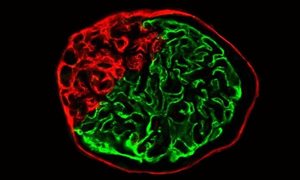About this research group
This research group aims to unravel the molecular processes underlying kidney regeneration and to identify new treatment targets to attenuate kidney disease progression.
read moreAims
Our group has several aims.-
In previous studies in experimental models of glomerulosclerosis, we have shown that activated parietal epithelial cells (PECs) are crucially involved in the development of glomerulosclerosis.
read more
New treatment options for glomerulosclerosis
Currently, there are limited options for treatment of glomerulosclerosis available. In previous studies in experimental models of glomerulosclerosis, we have shown that activated parietal epithelial cells (PECs) are crucially involved in the development of glomerulosclerosis. These results were validated in human biopsies. From these studies we proposed that persistent activation of PECs is driving disease progression and that pharmacological inactivation of PECs represents an effective and targeted treatment option to slow loss of renal function. -
We aim to identify the yet unknown molecular processes underlying this phenotypic switch, which is a prerequisite for developing specific therapies for prevention and recovery of AKI/CKD.
read more
To understand proximal tubular cell regeneration
Tubular cell injury is a common finding in biopsies of patients with acute kidney injury (AKI), as well as in chronic kidney disease (CKD). Tubular cell injury occurs in response to a variety of renal insults, most commonly ischemia. Nevertheless, tubules have a remarkable capacity to regenerate lost cells. Surviving proximal tubular cells are the major source for new proximal tubular cells. These surviving tubular cells acquire a different phenotype, the so called scattered tubular cell (STC) phenotype, which is transient and dependent of a specific transcriptional program facilitating tubular cell survival and regeneration. We aim to identify the yet unknown molecular processes underlying this phenotypic switch, which is a prerequisite for developing specific therapies for prevention and recovery of AKI/CKD.


